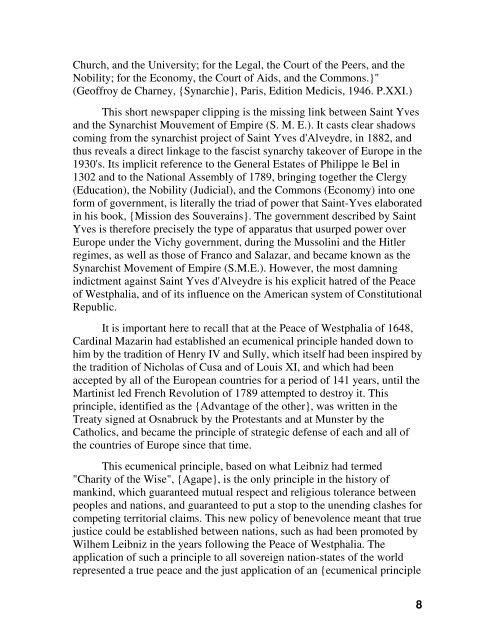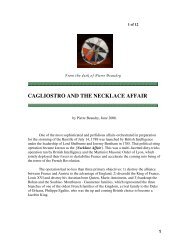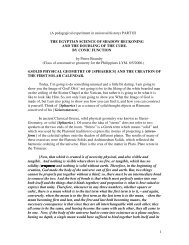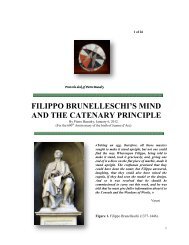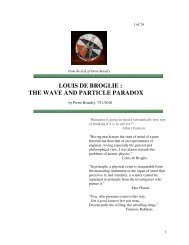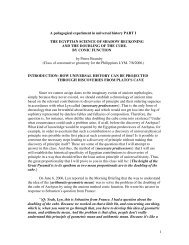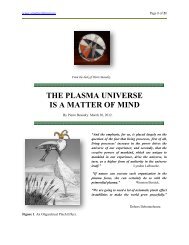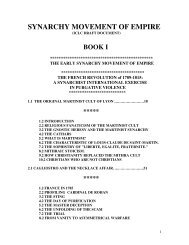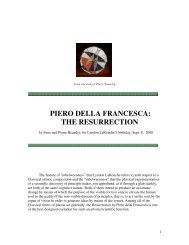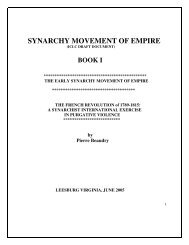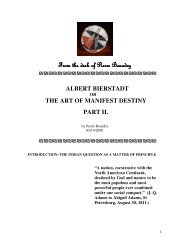synarchy movement of empire book ii - Pierre Beaudry's Galactic ...
synarchy movement of empire book ii - Pierre Beaudry's Galactic ...
synarchy movement of empire book ii - Pierre Beaudry's Galactic ...
Create successful ePaper yourself
Turn your PDF publications into a flip-book with our unique Google optimized e-Paper software.
Church, and the University; for the Legal, the Court <strong>of</strong> the Peers, and the<br />
Nobility; for the Economy, the Court <strong>of</strong> Aids, and the Commons.}"<br />
(Ge<strong>of</strong>froy de Charney, {Synarchie}, Paris, Edition Medicis, 1946. P.XXI.)<br />
This short newspaper clipping is the missing link between Saint Yves<br />
and the Synarchist Mouvement <strong>of</strong> Empire (S. M. E.). It casts clear shadows<br />
coming from the synarchist project <strong>of</strong> Saint Yves d'Alveydre, in 1882, and<br />
thus reveals a direct linkage to the fascist <strong>synarchy</strong> takeover <strong>of</strong> Europe in the<br />
1930's. Its implicit reference to the General Estates <strong>of</strong> Philippe le Bel in<br />
1302 and to the National Assembly <strong>of</strong> 1789, bringing together the Clergy<br />
(Education), the Nobility (Judicial), and the Commons (Economy) into one<br />
form <strong>of</strong> government, is literally the triad <strong>of</strong> power that Saint-Yves elaborated<br />
in his <strong>book</strong>, {Mission des Souverains}. The government described by Saint<br />
Yves is therefore precisely the type <strong>of</strong> apparatus that usurped power over<br />
Europe under the Vichy government, during the Mussolini and the Hitler<br />
regimes, as well as those <strong>of</strong> Franco and Salazar, and became known as the<br />
Synarchist Movement <strong>of</strong> Empire (S.M.E.). However, the most damning<br />
indictment against Saint Yves d'Alveydre is his explicit hatred <strong>of</strong> the Peace<br />
<strong>of</strong> Westphalia, and <strong>of</strong> its influence on the American system <strong>of</strong> Constitutional<br />
Republic.<br />
It is important here to recall that at the Peace <strong>of</strong> Westphalia <strong>of</strong> 1648,<br />
Cardinal Mazarin had established an ecumenical principle handed down to<br />
him by the tradition <strong>of</strong> Henry IV and Sully, which itself had been inspired by<br />
the tradition <strong>of</strong> Nicholas <strong>of</strong> Cusa and <strong>of</strong> Louis XI, and which had been<br />
accepted by all <strong>of</strong> the European countries for a period <strong>of</strong> 141 years, until the<br />
Martinist led French Revolution <strong>of</strong> 1789 attempted to destroy it. This<br />
principle, identified as the {Advantage <strong>of</strong> the other}, was written in the<br />
Treaty signed at Osnabruck by the Protestants and at Munster by the<br />
Catholics, and became the principle <strong>of</strong> strategic defense <strong>of</strong> each and all <strong>of</strong><br />
the countries <strong>of</strong> Europe since that time.<br />
This ecumenical principle, based on what Leibniz had termed<br />
"Charity <strong>of</strong> the Wise", {Agape}, is the only principle in the history <strong>of</strong><br />
mankind, which guaranteed mutual respect and religious tolerance between<br />
peoples and nations, and guaranteed to put a stop to the unending clashes for<br />
competing territorial claims. This new policy <strong>of</strong> benevolence meant that true<br />
justice could be established between nations, such as had been promoted by<br />
Wilhem Leibniz in the years following the Peace <strong>of</strong> Westphalia. The<br />
application <strong>of</strong> such a principle to all sovereign nation-states <strong>of</strong> the world<br />
represented a true peace and the just application <strong>of</strong> an {ecumenical principle<br />
8


